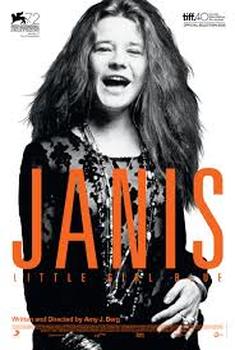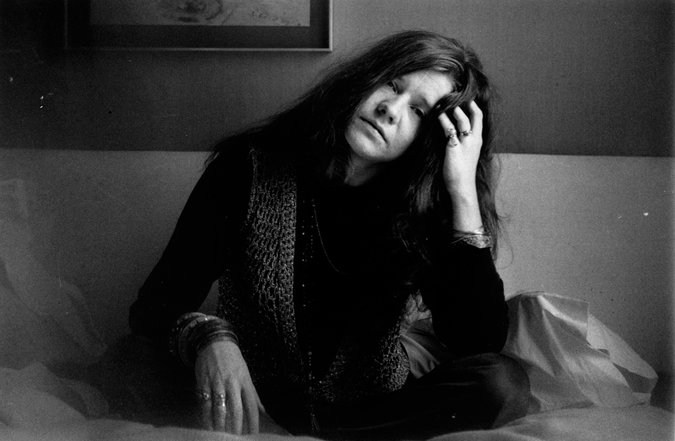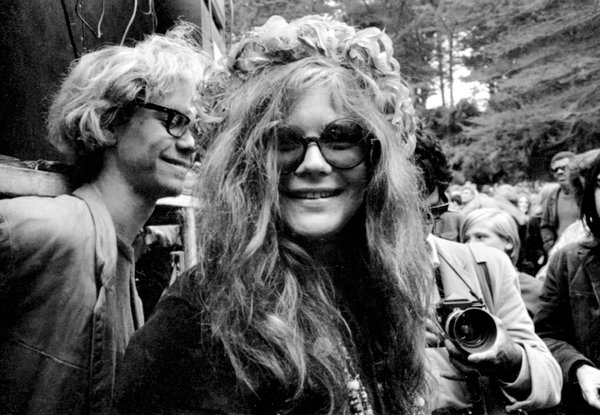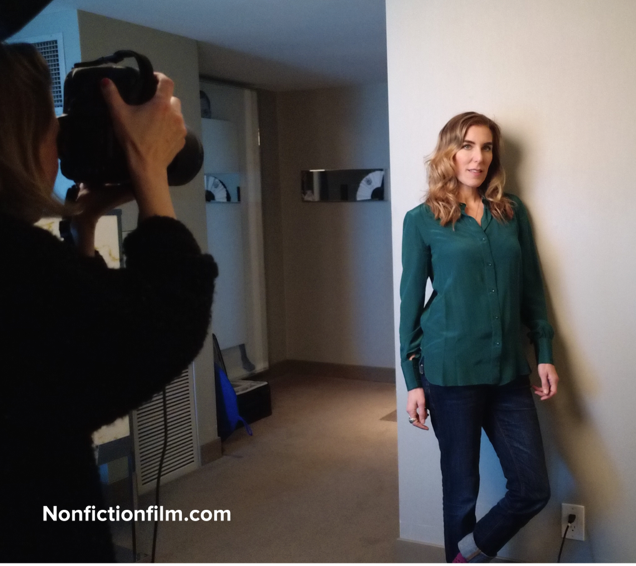|
Berg's Janis: Little Girl Blue documents creative brilliance and psychic pain of late legend
It's been 45 years since Janis Joplin's tragic death at the age of 27. But she comes back to life in all her searing vocal power and heartbreaking vulnerability in Janis: Little Girl Blue.
Oscar-nominated filmmaker Amy Berg directed the documentary, which draws on previously unseen footage of the singer as well as touching letters she wrote to her family [voiced over by Chan Marshall, aka Cat Power]. Janis opened this weekend in Los Angeles, Pasadena, Calif., and San Francisco where Joplin rose to fame in the 1960s as the lead singer for Big Brother and the Holding Company.
Google ad unit:
Nonfictionfilm.com spoke with Berg in Los Angeles about Joplin and the gender bias within the so-called "27 Club."
The film has been earning tremendous reviews since it opened in New York last week. That has to be rather gratifying for a filmmaker! Amy Berg: It’s been a really uniform response across the board which is really great. So I’m happy that people are liking it. I know that audiences like it, so that’s one step of what you’re hoping to achieve, but it’s also a great thing when the critics like your film. Forty-five years after her death, Janis Joplin is still such a present figure in our culture. Why do you think that is? AB: I feel like Janis’ music is kind of timeless in its own way. It doesn’t ever feel dated to me. She was a part of this iconic music moment in the 60s in San Francisco, but it never feels really dated. It just feels important and powerful and it feels like a woman sharing and baring her soul. So I think that will probably never change.
Tell me about the genesis of the film.
AB: A man named John McHugh, who’s a music supervisor, he was working with the Janis Joplin estate. He told me they were meeting with filmmakers and they were talking about doing a documentary and sharing their archive with someone. And so I was able to secure a meeting and I started talking to them and things moved along really quickly. And then we hit this major roadblock about two years in and the project was completely on ice. And then it came back. And then things started going again. Are you at liberty to reveal anything more about the major roadblock? Without getting too specific. [The arrangement between] the financiers and producers at the time and the estate fell apart... I had to kind of put a team together to help me get all those things sorted out and that’s where [producer] Alex Gibney came in. He helped me to bring in the finance and put the partnerships together and negotiate the contracts. It was really challenging, even for the attorneys involved. It was another two or three years of negotiations. The legal bills were very expensive on this film. Janis' younger siblings, Laura and Michael, are in the film. How was it to work with them? AB: She is their big sister, Janis. Obviously she was a very important person to them and they have access to everything that she left behind and things that they could collect from others — just amazing pieces of Janis that helped to tell the whole story. I’m sure this came up at some point where you say, “Well, I have to have final cut and hopefully you trust me.” AB: I did a couple of trailers in the beginning to show them what I wanted the film to look like and we had numerous discussions... I had final cut and they actually didn’t even really give me any notes. They were supportive of the film. They gave me access to what I needed and they offered advice and information on questions that I had in the process so it was really a healthy relationship. Her siblings seem very different from her, very mild-mannered. So it sort of begs the question— where did Janis' outsized personality come from? She seemed to be very different from people in her hometown [Port Arthur, Texas] and even her own family. AB: Yeah, but you’re looking at people that are in their 60s at this point. I mean Janis was in her 20s and she was rebelling and pushing the limits. I’m sure that she would have eventually found some kind of equilibrium. But she really didn’t in her life and that was really what the film was about, like trying to find balance and a middle ground despite all of the confusion that she was feeling inside and pain.
It was certainly fascinating to see her origins in Port Arthur and kind of what that did to her psychically.
AB: I believe she was getting to the point where she was starting to let that go at the end of her life but it is so hard to get over your adolescent issues in your 20s and I think she was just working through that. And she didn’t get to that point where she got on the other side of it, unfortunately. One of the amazing things in the film is the letters she wrote home from the road. What does it say about her relationship with her family that she cared enough to write? AB: Janis wanted everyone to love her... and her family was on the top of that list. She obviously didn't feel that they understood her and kind of accepted the decisions she made so she kept trying and trying and trying and then at a certain point she turned to drugs and you didn’t hear from her at all. There were no letters in that period when she was using drugs and then she kind of came back around when she got herself clean. So that said a lot to me about what was going on with Janis. We do get a strong sense in the film of partly what the allure of drugs were for her. How would you describe that? AB: It was a way for Janis to turn off. She was so “on” during that two-hour performance that she did every night and she then would come off stage and people wanted her to be that same person that they just experienced as a performer and she couldn’t keep that up so she would check out by doing drugs... Obviously she was trying to turn the voices off inside of her head where she was judging herself and caring so much about what everyone else thought. And here was this way she could be with people and not have to be “Janis Joplin.” She could just be this little girl or just a different version of herself.
Your film includes some of that incredible footage of Janis from the Monterey Pop Festival in 1967.
AB: That was her coming out party. You get into the story of how it almost didn't happen-- her being part of the D.A. Pennebaker film about the concert. AB: If she wasn’t in that film it would have been such a different film. It’s so crazy to think about that. That was her moment where you could see she has a business side to her too and she wasn’t going to just be one of those people who was forgotten in that moment. She saw how important it was. She was upset they weren’t filmed and she took action. She negotiated that for them [Big Brother and the Holding Company]. You also include some outtakes from Pennebaker's film. Why did you want to include those? AB: It’s a storytelling mechanism to tell more about what was going on in her world that night [in Monterey] and so having extra footage to tell that story is crucial because otherwise you’re just seeing what everyone has already seen before. I think it just rounds out the story for us. Janis is part of the "27 Club" -- all those music greats who died at age 27. You said something really interesting about that at the Grammy Museum. You feel there is sort of a gender distinction between how people view women in that club versus men. AB: When I think about Janis’ legacy to this point I think there’s been this kind of image of Janis as a wild party girl who died by herself in a hotel room and it’s less about her music and her artistry. I believe that that’s different with men. I don’t think you think about Jim Morrison just about the way he died. He still is always listed as a top singer of all time and one of the best bands of all time. And I think that Janis gets left off those lists often because she’s a woman. I think it’s really important that we put her on the list with Robert Plant and Mick Jagger and Steven Tyler. You know those guys got a lot of what they did from Janis if you think about the way they sing... She broke through a man’s world and people liked her because she was Janis, not because she was a girl singing in a band. It was who she was and what she did.
It’s been such an interesting year for music-related documentaries — between the Amy Winehouse documentary, Nina Simone and yours.
AB: And Montage of Heck [about Kurt Cobain] The "27 Club" is well-represented. For viewers it’s like an embarrassment of riches. But if you had it to do over again would it be better to maybe come out with Janis at a different time so that viewers weren’t sort of faced with -- AB: —Overloaded. Well, I don’t know about overloaded. AB: I think it’s just bringing more attention to documentaries in general. This is such a good time for documentaries… As somebody who’s been in this industry for, I don’t know, almost 10 years now I feel like I’ve watched the industry just kind of flourish and it’s a great thing to just be a part of. The way movies live today, it doesn’t really matter when they come out in a way. They will live somewhere forever so I think it’s great to even be in the same conversation as those films because they’re all such great films. |
AuthorMatthew Carey is a documentary filmmaker and journalist. His work has appeared on Deadline.com, CNN, CNN.com, TheWrap.com, NBCNews.com and in Documentary magazine. |
- Home
- News
- Videos
-
Galleries
- 2019 Tribeca Film Festival
- Full Frame Documentary Film Festival
- 2019 SXSW Film Festival
- SXSW 2018 Gallery
- 2019 Sundance Film Festival
- Outfest 2018 Photo Gallery
- Outfest 2017
- Sundance 2018 Photos
- 2017 LA Film Festival
- 2017 Cannes Film Festival
- Tribeca Film Festival 2017
- SXSW 2017 Gallery
- 2017 Berlin Film Festival
- Sundance 2017 Gallery
- 2016 Los Angeles Film Festival
- Cannes Film Festival 2016
- SXSW 2016 Gallery
- Berlinale 2016 Gallery
- Sundance 2016 Gallery
- Filmmaker Gallery
- About
- Contact
Proudly powered by Weebly
- Home
- News
- Videos
-
Galleries
- 2019 Tribeca Film Festival
- Full Frame Documentary Film Festival
- 2019 SXSW Film Festival
- SXSW 2018 Gallery
- 2019 Sundance Film Festival
- Outfest 2018 Photo Gallery
- Outfest 2017
- Sundance 2018 Photos
- 2017 LA Film Festival
- 2017 Cannes Film Festival
- Tribeca Film Festival 2017
- SXSW 2017 Gallery
- 2017 Berlin Film Festival
- Sundance 2017 Gallery
- 2016 Los Angeles Film Festival
- Cannes Film Festival 2016
- SXSW 2016 Gallery
- Berlinale 2016 Gallery
- Sundance 2016 Gallery
- Filmmaker Gallery
- About
- Contact





 RSS Feed
RSS Feed